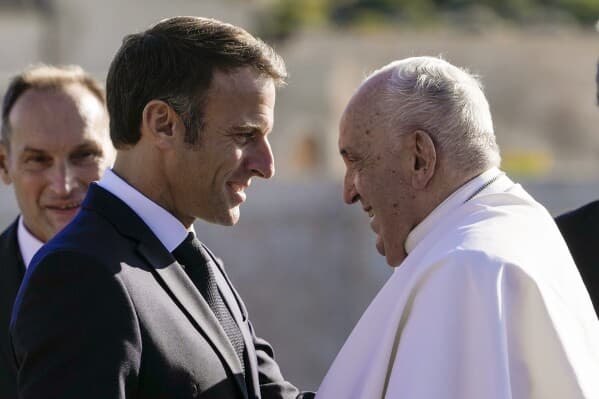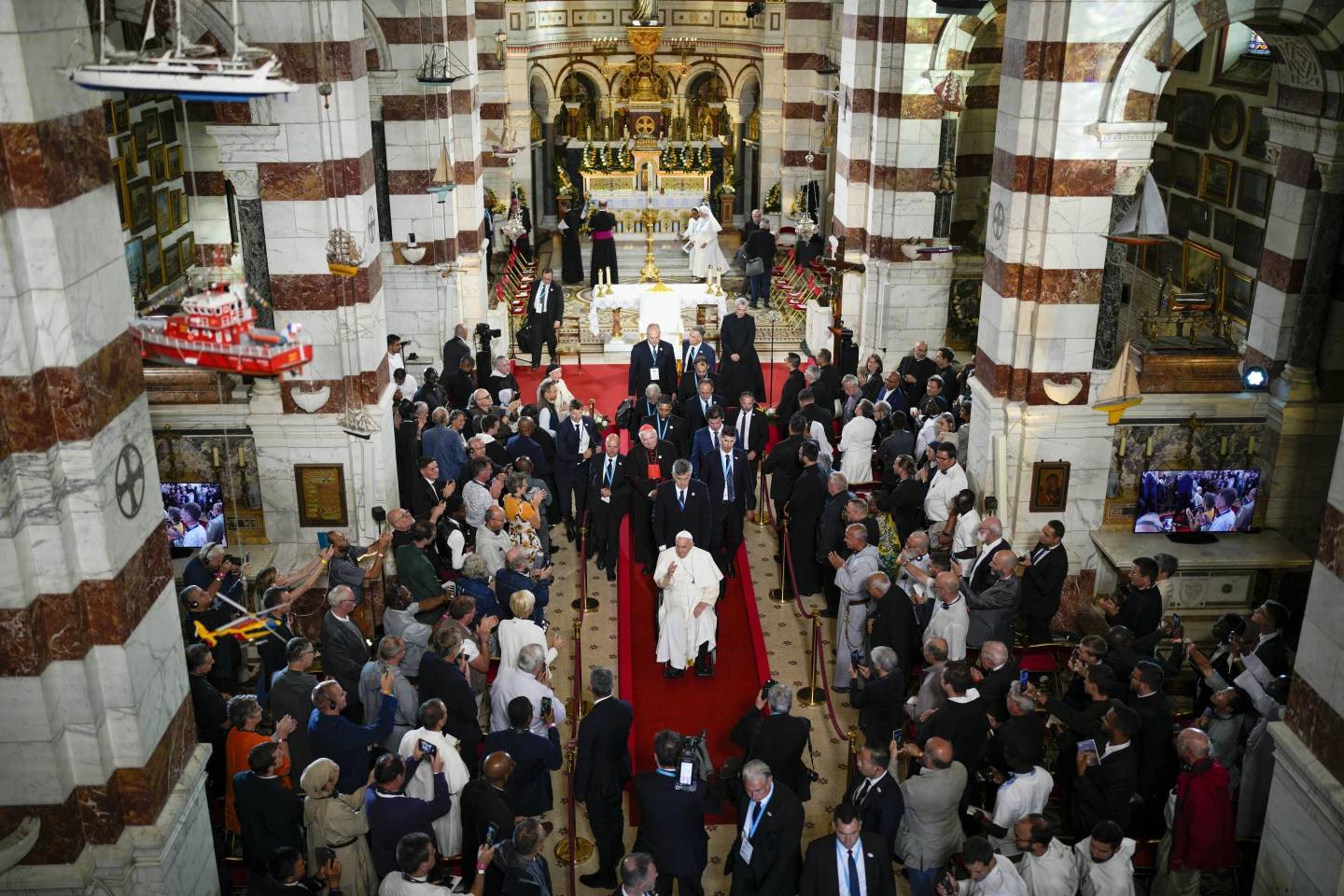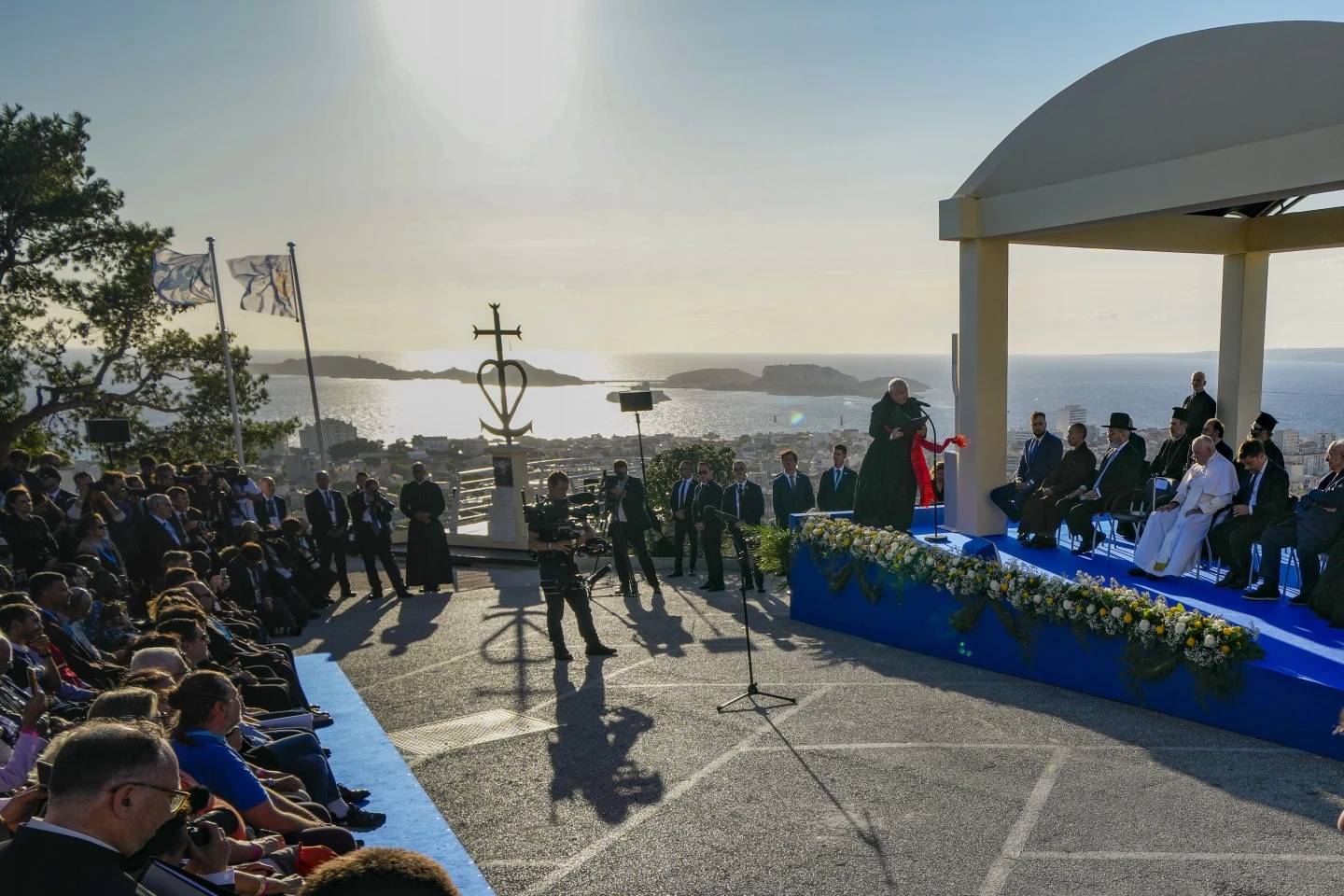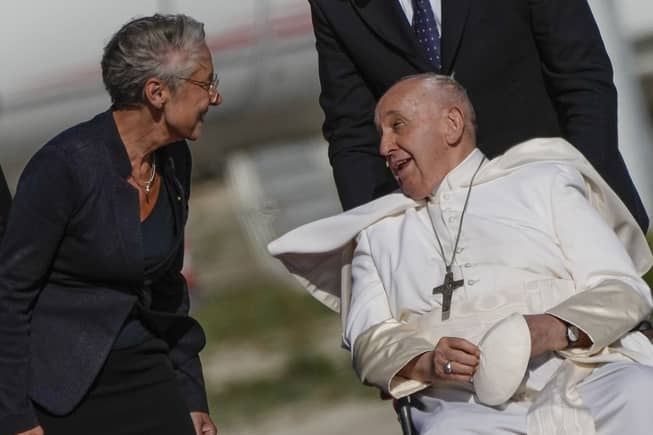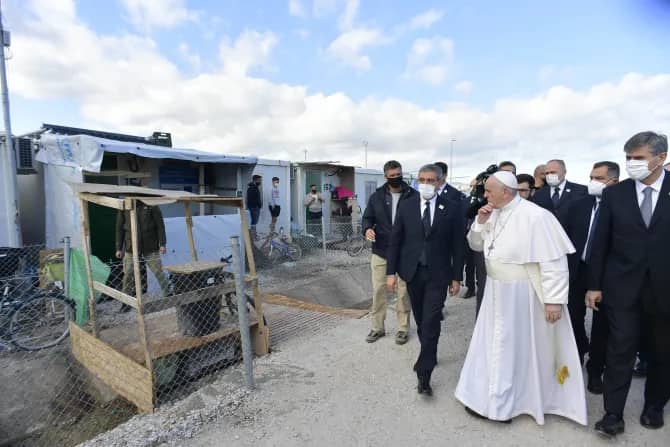ABOARD THE PAPAL PLANE – Pope Francis condemned both abortion and euthanasia Saturday, saying about end-of-life issues that the lives of the elderly must not be “cancelled” by an ideological colonization that seeks to eliminate pain.
Pope Francis spoke to journalists on board his Sept. 23 return flight from Marseille to Rome, after making a brief overnight visit to the city to close a conference on the Mediterranean that focused largely on migration, including several bold appeals from the pope for a more compassionate and welcoming stance in Europe.
Asked about a controversial law France is preparing to consider on euthanasia, the pontiff, who condemned the practices of abortion and euthanasia in his final Mass on Saturday, said he did not address the issue in his private conversation with French President Emmanuel Macron earlier that day.
He said he and Macron discussed the issue of euthanasia during one of Macron’s three previous visits to the Vatican, and on that occasion, “I told him my view, clearly, [that] you don’t play with life, not at the beginning, and not at the end. You don’t play with it.”
“It’s not just my opinion, it’s safeguarding life, because then, you end up with the politics of non-pain, a humanistic euthanasia,” he said. He once again referenced a 1903 futuristic romance novel titled The Lord of the World by a British convert to Catholicism which, Francis said, depicts “how things will be in the end. It takes away the differences of everyone, and also, they take pain, etc., and euthanasia is one of these things.”
“Sweet death, selection before birth. This shows how this man saw current conflicts,” the pope said, saying, “today let’s be attentive to ideological colonization that ruins human life and goes against human life.”
Macron is expected to present an end-of-life bill shortly, which most observers believe will contain some provision to legalize “active aid” in helping people who request it to die. Present law allows only “deep sedation” to comfort people near death who are in pain, but opinion polls show a narrow majority in favor of some form of assisted suicide.
Details of the proposed legislation have not been revealed, and French media reported that Macron deliberately withheld bringing it forward until after the pope’s visit to Marseille.
Speaking of the plight many elderly people who are lonely or abandoned face, he said, “Today the lives of the elderly are cancelled,” and that when youth don’t speak to elderly in their lives, “they are cancelled…they are old, they are useless.”
“You don’t mess with life…whether it’s a law that prohibits a child from growing in the womb” or euthanasia, he said, saying to care for someone in suffering and near death is “something human, human. It’s compassion.”
“Science has arrived to making some painful illness less painful with medicine. You don’t mess with life,” he said.
Asked about the peace mission of Italian Cardinal Matteo Zuppi, the pope’s personal peace envoy for the war in Ukraine, Francis said at times he feels “some frustration” over the lack of progress, noting that the Vatican’s Secretariat of State is “doing everything to help.”
As part of his peace mission, Zuppi has made visits to Kyiv, Moscow, Washington DC, and Beijing, focusing primarily on the humanitarian aspect of the war, including the return of Ukrainian children deported to Russia and also a deal that allowed for the export of grain from Ukrainian ports before Russia backed out of the agreement in July.
Though he did not offer details of the status of Zuppi’s mission or what might come next, he said the work on retuning Ukrainian children “is going well.”
Francis also reiterated his condemnations of the global arms trade.
“This war brings to mind something involved not only in Russia and Ukraine, [which is] to sell weapons, the arms trade…today the investments that give the most profits are the production of arms, the production of death,” he said.
“We should not play with the martyrdom of this people … we must resolve things in the most possible way. We shouldn’t have illusions that the two leaders of the war will go eat together tomorrow. We should be humble about what’s possible,” the pope said.
Francis also appeared to criticize countries that have promised arms to Ukraine but are reconsidering such support.
“Now we see that some countries are going backward, they aren’t giving weapons, and a process is beginning in which the martyrs are the Ukrainian people, certainly. This is something terrible,” he said.
The Vatican later issued a clarification, saying the pope’s point was that arms merchants never pay the price of their choices, which fall upon “martyred” peoples such as the Ukrainians.
The pontiff was also asked about his outspoken messages in favor of migrants during his brief visit and whether, after ten years of repeating the same thing since his July 2013 visit to the Italian island of Lampedusa, a primary destination point for migrants from North African seeking entry into Europe, he feels he has failed.
“I would say not. I’d say that growth happens slowly. Today there is awareness of the migratory problem. There is awareness. There is also awareness that it is something that has arrived to the point of a boiling potato and you don’t know how” to handle it, he said.
The pope condemned situations in which migrants are treated “like a ping pong [ball], sent back. And it is known that many times they end up in lagers, they end up worse than before.”
“It’s a reign of terror. They suffer not only because they need to leave, but the suffer because of the reign of terror there, they are slaves. We can’t, without looking at things, send them back like a ping pong ball,” he said.
Pope Francis again insisted that migrants must be “welcomed, accompanied, promoted and integrated…but don’t let them fall into the hands of these cruel people.”
He said he invited the head of the Mediterranean (group) Saving Humans to attend the upcoming Synod of Bishops on Synodality, saying the organization has “terrible stories” to tell.
Referring to his visit to Lampedusa, Francis said he did not even know where the island was when he decided to go, but had read stories and in prayer felt a tug saying he needed to go.
“In prayer I heard inside, you have to go there, as if the Lord led me there,” he said.
